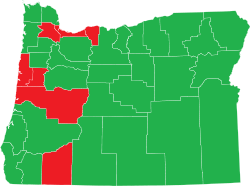- Oregon Ballot Measure 61 (2008)
-
Measure 61 Creates mandatory minimum prison sentences for certain theft, identity theft, forgery, drug, and burglary crimes. Election results Yes or no Votes Percentage  No
No887,165 51.10% Yes 848,901 48.90% Invalid or blank votes % Total votes 1,736,066 100.00% Voter turnout 85.7% Election results by county YesNoSource: Oregon Secretary of State [1]
Oregon Ballot Measure 61 was an initiated state statute ballot measure that enacted law to create mandatory minimum prison sentences for certain theft, identity theft, forgery, drug, and burglary crimes.The measure appeared on the November 4, 2008 general election ballot in Oregon, as did Measure 57 which dealt with similar issues, but in a different way.[2]
Contents
Background
In 1994, Measure 11, another initiative proposed by Kevin Mannix, was passed, which set mandatory minimum sentences for violent crimes. It is responsible for 28% of today's prison population. Oregon uses the highest percentage of its state budget to lock up criminals and supervise parole of any state. Oregon has seen a growth in prison inmates from about 4,000 to more than 13,500.
If Ballot Measure 61, or the competitive measure proposed by the legislature, is passed, Oregon's prison population and percentage of state budget will become more pronounced. At the same time, Oregon has seen a greater drop in violent crime than the rest of the country on average since Measure 11 passed.[3]
Measure 61 versus Measure 57
In February 2008, some members of the Oregon State Legislature proposed a bill to put a legislatively-referred ballot measure, Measure 57, on the November 2008 ballot that would compete with Measure 61, but which would have less stringent mandatory minimums in it.[4] In response, Mannix said that this "stinks of political manipulation". His concern is with how the competing measure's ballot title is set. If the ballot title sounds tough-on-crime, voters--many of whom will judge the measure simply based on its title--might vote for it, even though (Mannix alleges) the competing legislative measure is "wimpy".[5]
The key difference between the competing measures lies in how they treat first-time offenders. Measure 61 requires mandatory jail time for some first-time offenders; the competing measure does not.
Supporters of Measure 61 believe that the method of establishing the ballot title for Oregon ballot measures is unfair and gives the legislatively-referred Measure 57 an undue advantage at the polls. For a citizen-initiated measure in Oregon, the ballot title is determined by the state's Attorney General. In the case of the measure that will compete with Measure 61, the claim has been made that the legislature plans to set the ballot title without going through those normal channels.[6],[7]
Specific provisions
Ballot Measure 61 enacted the following provisions:
- Sets mandatory minimum sentences for certain drug and property crimes and for identity theft.
- It establishes a new felony crime of motor vehicle theft.
- A person sentenced under Measure 61 sentencing guidelines must serve his or her full sentence--the sentence could not be reduced for any reason.
- The sentences must be served in state prison facilities and work camps.
- The state is to reimburse counties for the cost of pre-trial detention for persons sentenced under Measure 61.
- Manufacturing or dealing heroin or ecstasy requires 36 months in prison.
- Manufacturing or dealing meth or cocaine within 1000 feet of a school requires 36 months in prison.
- Persons convicted of burglarizing a residence or identity theft must serve a 36-month sentence.[8]
Estimated fiscal impact
The state's Financial Estimate Committee prepares estimated fiscal impact statements for any ballot measures that will appear on the ballot. The estimate prepared by this committee for Measure 61 says:
- Measure 61 would require additional state spending of between $8-$10 million in the first year.
- In the second year, it would cost from $67-$88 million.
- In the third year, the cost would be $122-$178 million.
- In the fourth and subsequent years, the cost would rise to $164 million and on up.[9]
The state's Criminal Justice Commission said that the Mannix measure will cost between $128-$200 million a year, whereas the competing measure, Measure 57, would cost between $65-70 million per year.[10]
Support
The chief petitioners for Measure 61 were Kevin Mannix, Duane Fletchall and Steve Beck. Kevin Mannix said that Oregon's incarceration rate is below the national average and that the costs are high because of well-compensated corrections officers. "You get what you pay for", Mannix argued, adding that state prisons are among the most drug-free in the country.
Oregon prison officials questioned the Pew Center's numbers, mentioned below, and also pointed out that the Department of Corrections funnels about 20 percent of its budget directly to counties for jails and parole.[3]
Loren Parks, the biggest political contributor in Oregon history, donated over $100,000 to the campaign for this measure.[11]
Opposition
Arguments against Measure 61
Notable arguments in opposition to the measure included:
- Prison budgets take away from other government programs.
- "The point is getting tough on crime has gotten tough on taxpayers".[3]
- It is one-size-fits-all and doesn't take account of differing circumstances.[12]
Donors opposing Measure 61
Defend Oregon, as a committee, fought seven different ballot measures, and supported two others. As a result, it is not possible to discern how much of its campaign money was going specifically to defeat Measure 59. Altogether, the group raised over $6 million in 2008.[13]
Major donations to the Defend Oregon group as of October 8 included:[14]
- $4.1 million from the Oregon Education Association.[15],[16]
- $100,000 from School Employees Exercising Democracy (SEED)[17]
- $100,000 from the AFL-CIO.
- $50,000 from Oregon AFSCME Council 75.
Further reading
- StatesmanJournal.com: "Kroger backs alternative to crime measure", July 17, 2008
- "Either anti-crime measure will cost over $1 billion, state says", Oregons Against Measure 11
- The Oregonian, "Loren Parks begins spending on Oregon crime measures", August 14, 2008
Notes
- ^ Bradbury, Bill (4 November 2008). "Official Results – November 4, 2008 General Election" (Website). Elections Division. Oregon Secretary of State. http://www.sos.state.or.us/elections/nov42008/g08results.html. Retrieved December 24, 2008.
- ^ OregonLive.com: "Mannix's tough-on-crime measure will be on Oregon ballot", The Oregonian, April 11, 2008
- ^ a b c Prisons Lock in a Chunk of Budget from The Oregonian
- ^ Crime measures will fight it out come fall The Oregonian, February 23, 2008
- ^ Mannix says Ore. lawmakers stacking the deck against his measure
- ^ Developing hard, Democrats avoiding review process again! Ted Piccolo, February 16, 2008
- ^ Salem Democrats to give Republicans the perfect issue
- ^ Specific provisions of Measure 61
- ^ Estimated fiscal impact statement for Oregon Measure 60
- ^ Bill poses crime-fighting choice Edward Walsh, The Oregonian, February 13, 2008
- ^ The Oregonian: "Loren Parks adds $100,000 to crime measures", September 4, 2008
- ^ "Measure 57 Yes, Measure 61 No". Hillsboro Argus. October 7, 2008. http://www.oregonlive.com/opinion/argus/index.ssf?/base/editorial/122340363768430.xml&coll=6.
- ^ Campaign finance history of Defend Oregon for 2008
- ^ Record of donations to Defend Oregon
- ^ Oregon Live, "Teachers, nurses add $2.5 million to campaigns", September 10, 2008
- ^ The Oregonian, "OEA puts $4 million into ballot measure fight", October 8, 2008
- ^ Oregonian, "School workers add $100,000 to campaign", August 25, 2008
External links
Basic information
- Chief Petitioner Kevin Mannix on BallotPedia.org
- Oregon Voters' Pamphlet for Measure 61
- 2008 General Election Measures: Voter Guide
- Full text of the initiative
- Status and information on this initiative from the Oregon Secretary of State
Opponents
Topics in Oregon legislation Crime and sentencing Capital punishment · Measure 11 (1994) (mandatory minimum sentencing) · Measure 40 (1996) etc. (victims' rights) Abigail Scott Duniway was instrumental in establishing women's right to vote in Oregon.
Abigail Scott Duniway was instrumental in establishing women's right to vote in Oregon.
Elections and voting Gay rights Environment Land use Health care Minimum wage Taxation Tax revolt · Measure 5 (1990) (landmark tax law) · Measures 47 (1996) and 50 (1997) (adjusted Measure 5) · Kicker (tax rebate)Miscellaneous Influential people Background, further reading 2007 ← Oregon 2008 Elections → 2010 Categories:- Oregon 2008 ballot measures
Wikimedia Foundation. 2010.

